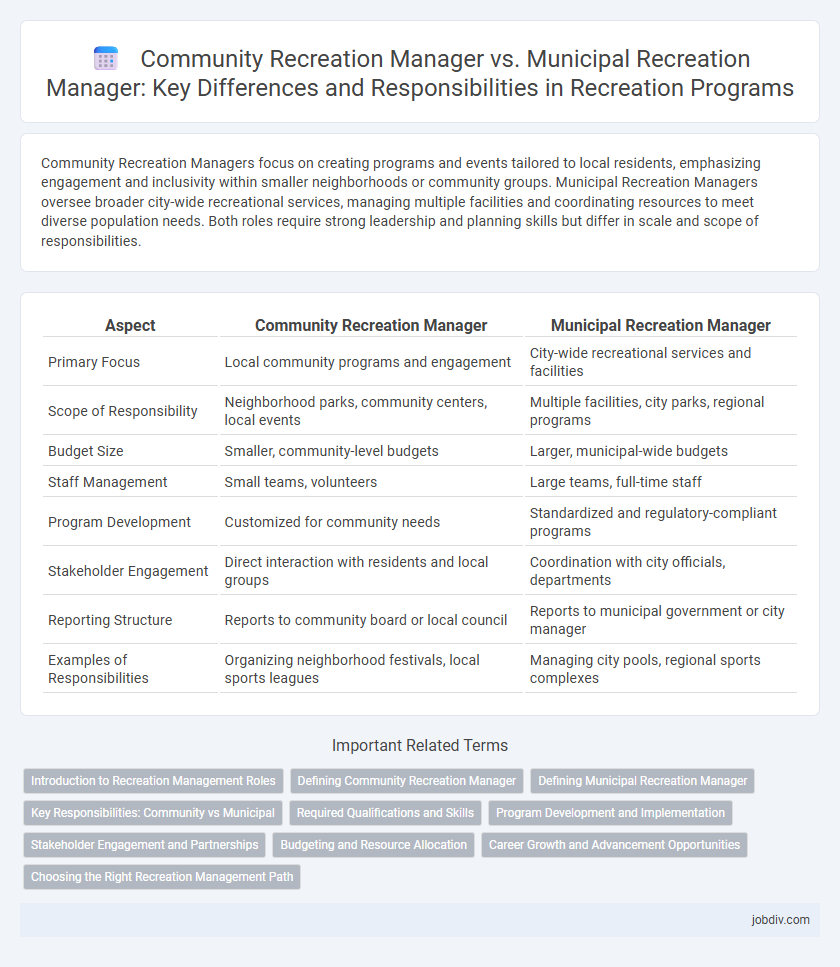Community Recreation Managers focus on creating programs and events tailored to local residents, emphasizing engagement and inclusivity within smaller neighborhoods or community groups. Municipal Recreation Managers oversee broader city-wide recreational services, managing multiple facilities and coordinating resources to meet diverse population needs. Both roles require strong leadership and planning skills but differ in scale and scope of responsibilities.
Table of Comparison
| Aspect | Community Recreation Manager | Municipal Recreation Manager |
|---|---|---|
| Primary Focus | Local community programs and engagement | City-wide recreational services and facilities |
| Scope of Responsibility | Neighborhood parks, community centers, local events | Multiple facilities, city parks, regional programs |
| Budget Size | Smaller, community-level budgets | Larger, municipal-wide budgets |
| Staff Management | Small teams, volunteers | Large teams, full-time staff |
| Program Development | Customized for community needs | Standardized and regulatory-compliant programs |
| Stakeholder Engagement | Direct interaction with residents and local groups | Coordination with city officials, departments |
| Reporting Structure | Reports to community board or local council | Reports to municipal government or city manager |
| Examples of Responsibilities | Organizing neighborhood festivals, local sports leagues | Managing city pools, regional sports complexes |
Introduction to Recreation Management Roles
Community Recreation Managers oversee diverse local programs promoting health, social engagement, and cultural activities tailored to neighborhood needs, emphasizing collaboration with residents and stakeholders. Municipal Recreation Managers coordinate city-wide recreational services, facilities, and events, managing budgets and policy implementation to support broader urban populations. Both roles require strategic planning, resource allocation, and leadership to enhance community well-being through effective recreational services.
Defining Community Recreation Manager
A Community Recreation Manager oversees local programs designed to enhance public well-being through organized sports, cultural events, and educational activities tailored to diverse neighborhood needs. They collaborate with community members, nonprofit organizations, and local businesses to create inclusive recreational opportunities that promote social engagement and healthy lifestyles. This role emphasizes grassroots involvement and accessibility, distinguishing it from a Municipal Recreation Manager who typically manages broader city-wide facilities and public parks.
Defining Municipal Recreation Manager
A Municipal Recreation Manager is responsible for overseeing recreational programs, facilities, and services within a specific municipality, ensuring alignment with local government policies and community needs. This role involves coordinating public parks, sports leagues, and cultural events while managing budgets and staff to enhance community engagement. Unlike a Community Recreation Manager who may work with broader or non-governmental organizations, the Municipal Recreation Manager operates within the municipal framework to deliver structured, accessible programs tailored to residents.
Key Responsibilities: Community vs Municipal
Community Recreation Managers focus on organizing local programs, managing community centers, and fostering neighborhood engagement through tailored activities and partnerships with local organizations. Municipal Recreation Managers oversee city-wide recreation services, including strategic planning, budgeting, policy implementation, and managing public parks, sports facilities, and large-scale events. Both roles prioritize enhancing public access to recreational resources, but Municipal Managers handle broader operational scopes and coordination with governmental agencies.
Required Qualifications and Skills
A Community Recreation Manager typically requires a degree in recreation management, public administration, or a related field, along with strong interpersonal and leadership skills to engage diverse local groups effectively. A Municipal Recreation Manager often needs advanced certifications such as CPRP (Certified Park and Recreation Professional) and experience in public sector budgeting, policy development, and strategic planning. Both roles demand proficiency in program development, facility management, and the ability to collaborate with government agencies and community stakeholders.
Program Development and Implementation
Community Recreation Managers concentrate on designing and delivering diverse programs that address local residents' interests and cultural needs, ensuring inclusive participation and maximizing community engagement. Municipal Recreation Managers oversee broader program development within city departments, aligning recreation offerings with municipal policies, budget constraints, and long-term strategic goals for public health and wellness. Both roles require expertise in resource allocation, stakeholder collaboration, and assessment of program effectiveness to enhance recreational services.
Stakeholder Engagement and Partnerships
Community Recreation Managers prioritize grassroots stakeholder engagement by collaborating closely with local nonprofits, schools, and resident groups to tailor programs that meet diverse neighborhood needs. Municipal Recreation Managers focus on cultivating formal partnerships with city departments, government agencies, and regional organizations to align recreation services with broader urban planning and policy objectives. Both roles emphasize strategic alliance building but differ in scale and stakeholder complexity, impacting resource allocation and program outreach.
Budgeting and Resource Allocation
Community Recreation Managers focus on optimizing local facility usage and program funding by allocating budgets to meet neighborhood-specific needs, often working with volunteers and local partners. Municipal Recreation Managers oversee larger-scale resource distribution, managing comprehensive budgets that cover multiple community centers, parks, and city-wide programs to ensure equitable access and operational efficiency. Both roles require strategic financial planning but differ in scope, with municipal managers handling more complex fiscal responsibilities across broader jurisdictions.
Career Growth and Advancement Opportunities
Community Recreation Managers often oversee localized programs, providing opportunities to develop specialized skills in community engagement and program development, which can lead to roles in nonprofit leadership or regional recreation departments. Municipal Recreation Managers manage broader city-wide initiatives, offering greater exposure to government operations, budget management, and large-scale event coordination, paving the way for advancement into senior public sector positions or municipal department directorships. Career growth in both roles depends on leadership capabilities and the ability to navigate partnerships, but municipal roles typically offer higher hierarchical advancement within government agencies.
Choosing the Right Recreation Management Path
Choosing the right recreation management path depends on career goals, scope of responsibilities, and community impact. Community Recreation Managers typically focus on programming, engagement, and local partnerships within specific neighborhoods or organizations. Municipal Recreation Managers oversee broader city-wide initiatives, budget allocation, and policy development, making their role more administrative and strategic in public recreation services.
Community Recreation Manager vs Municipal Recreation Manager Infographic

 jobdiv.com
jobdiv.com